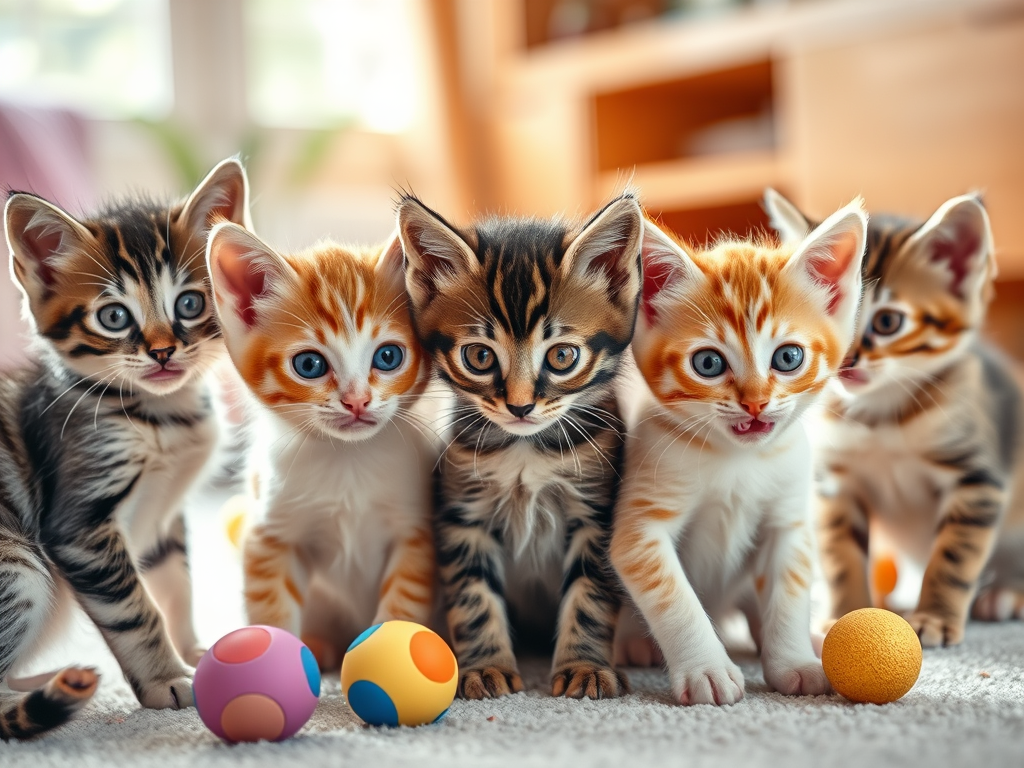Maximize Your Kitten’s Happiness: The Critical Importance of Early Socialization
Socialization is an essential journey for kittens, significantly impacting their ability to adapt and thrive in diverse environments. This pivotal stage in their development shapes their personalities, enabling them to grow into confident and friendly adult cats. When kittens miss out on proper socialization, they are more likely to develop anxiety and fear towards humans and other animals, leading to behavioral issues that could affect their happiness and that of their owners. By dedicating time to socializing your kitten, you are laying the groundwork for a joyful and fulfilling companionship that lasts a lifetime.
Beginning the socialization process early provides a plethora of benefits that significantly improve your kitten’s overall quality of life. Picture a serene pet who remains calm and collected during visits from friends or is unfazed by the neighbor’s barking dog. Kittens that receive thorough socialization are generally more resilient, adapting seamlessly to new experiences, which helps reduce anxiety and drama in their everyday lives.
Research has shown that kittens who are socialized effectively during their formative weeks tend to exhibit fewer behavioral issues as they grow. These well-adjusted kittens are usually more playful, show less aggression, and navigate social interactions with ease. This positive development creates a harmonious home environment, fostering a loving atmosphere for both the kitten and its human family members.
Experts in animal behavior and feline psychology consistently highlight the critical role that socialization plays in a kitten’s overall mental health. By providing these essential experiences during their early developmental stages, you equip them with the skills necessary to flourish in various scenarios, ensuring a fulfilling and happy life.

Timing and Setting: Create the Perfect Environment for Kitten Socialization
Effective kitten socialization hinges on the right timing. The optimal period for socialization typically falls between two to nine weeks of age. During this critical developmental window, kittens are exceptionally open to new experiences, making it the ideal time to introduce them to various stimuli. If you aspire for your kitten to grow into a well-adjusted and confident adult, this timeframe is absolutely essential.
Additionally, the environment you provide plays a vital role in the socialization process. A serene and safe space allows your curious little one to explore freely without fear or stress. Avoid loud noises and sudden movements that may startle a young kitten, as these can hinder their ability to adjust. Instead, create a cozy hideaway where they can feel secure while gradually being introduced to new experiences.
Socialization involves not just the physical surroundings, but also the emotional atmosphere you cultivate. By being gentle and patient, you nurture your kitten’s natural curiosity and confidence. Allowing them to engage with new experiences at their own pace is crucial to ensuring they do not feel overwhelmed or frightened.
Establishing a sense of safety during their explorations is paramount to building trust that lasts a lifetime. Throughout this significant developmental phase, kittens should be exposed to a range of experiences to prepare them for life’s ups and downs, teaching them how to manage unforeseen challenges early on.
Effective Strategies for Successful Kitten Socialization
To help your kitten feel at home in their environment, it’s essential to employ a variety of effective techniques that create a positive socialization experience. Start with gradual introductions to different stimuli, offering small, manageable doses of new textures, sounds, and people. This approach prevents overwhelming your kitten while ensuring they receive the necessary exposure.
Interactive playtime can be transformative in your kitten’s socialization journey. Engaging toys that mimic prey behavior can significantly enhance their coordination and promote interaction with both humans and other animals, fostering greater comfort levels in social settings.
Handling your kitten gently and frequently is another crucial aspect of their socialization. Interactions with different individuals during their early weeks help foster trust and create positive associations with humans. Regularly stroke, hold, and engage in playful activities, ensuring each experience is enjoyable rather than intimidating for your kitten.
Pay close attention to your kitten’s body language, as they communicate a great deal through their behavior. If they show signs of discomfort, it’s essential to slow down and reassess your approach. Utilize positive reinforcement, such as treats or praise, to encourage your kitten when they respond positively to new experiences. This strategy not only reinforces good behavior but also strengthens the bond of trust between you and your furry companion.

Overcoming Common Obstacles in Kitten Socialization
Socializing a kitten can present various challenges, as each kitten possesses its unique personality traits. Some kittens may be more reluctant to venture beyond their comfort zones, making the process less straightforward.
Shyness and fear are frequent hurdles that many kittens encounter. You might notice your kitten retreating to hiding spots when unfamiliar individuals enter the room or scurrying away at the sound of barking dogs. It’s crucial to approach these situations with sensitivity, allowing your kitten to observe from a distance before gradually moving closer, rather than forcing them into uncomfortable interactions.
Patience and consistency are your best allies throughout this journey. Establishing a stable routine provides a sense of security for your kitten, while patience allows them to adapt at their own pace without feeling pressured.
If your kitten is experiencing significant challenges in socialization, consider seeking professional assistance. A veterinarian or animal behaviorist can offer invaluable insights and tailored strategies to guide your kitten in overcoming specific obstacles they may face during their socialization process.
Building trust takes time and commitment. With a gentle approach, understanding, and ongoing support, even the shyest kittens can learn to thrive in a social environment and embrace the company of others.
Long-Term Benefits of Comprehensive Kitten Socialization
Engaging in kitten socialization is not merely a short-term task; it represents a vital investment in their future well-being. Kittens that undergo proper socialization are more likely to evolve into adaptable, curious, and affectionate adult cats. These well-adjusted felines often develop deeper connections with their human companions and other pets, leading to a more integrated family life.
A kitten that is comfortable in various situations opens up a world of opportunities for both themselves and their owners. Traveling, attending veterinary appointments, or introducing new family members or pets become far less challenging when a cat is accustomed to navigating changes with grace and confidence.
Socially adept cats tend to enjoy more fulfilling lives, experiencing reduced stress in their daily routines. They can embrace new adventures without fear, whether it involves making new friends or exploring different areas of the home.
Many pet owners who have devoted time to socializing their kittens share stories that highlight the immense rewards of this effort. Observing a once-timid kitten joyfully engaging with the world around them is incredibly gratifying and serves as a testament to the profound impact of a thoughtful and patient approach to socialization.
The Article : The Importance Of Socializing A Kitten Appeared First On Unity Pets.
The Article Socializing a Kitten: Why It’s Essential for Development Was Found On https://limitsofstrategy.com

